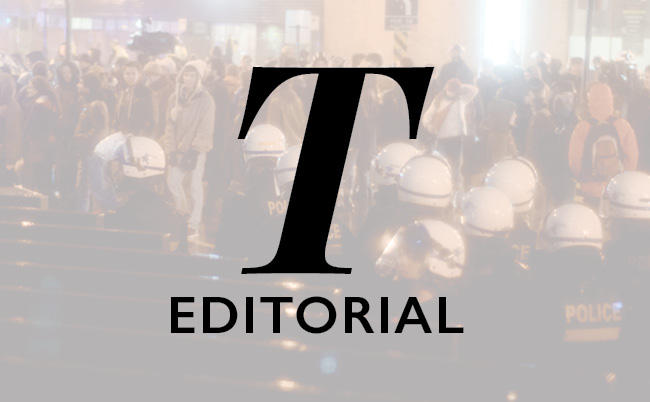A report released by three professors at l’Université de Montreal released on Oct. 7 found that the Service de police de la Ville de Montréal (SPVM) were 11 times more likely to stop Indigenous women on the street than white women, four to five times more likely to subject black and Indigenous people to street checks, and twice as likely to stop people of Arab descent compared to white people. These numbers reflect the reality of people of colour living in Montreal, who experience systemic racism in their daily lives and exist within racist institutions. Montreal and McGill have an obligation to protect the safety and dignity of racialized people and to prioritize anti-oppressive approaches to security.
While this report was one of the first to quantify it, the SPVM has a long history of racial profiling. From the SPVM’s action plan against social and racial profiling’s creation in 2017, only one third of the plan was implemented, resulting in little noticable improvement. The police service’s most recent action plan—released in 2018—was criticized for using ambiguous language that created loopholes for racial profiling. For example, In Feb. 2019, Montreal mayor Valérie Plante and the SPVM chose not to outfit officers with body cameras, citing high costs as well as police feeling “too surveilled” while on the job. However, Montrealers of colour spoke of experiencing stress, trauma, or anxiety after facing police abuse or being “arbitrarily watched, stopped, and detained.” Body cameras have been proven to reduce violence; a mild sense of surveillance for the SPVM team is a reasonable trade-off for the preservation of the safety and wellbeing of racialized people.
Given these past failures in accountability and integrity, it is vital that the SPVM maintain transparency with their next steps to address the racial profiling crisis.
The racial profiling report, which was commissioned by the City of Montreal, comes in the wake of the release of the Missing and Murdered Indigenous Women and Girls report on June 3. This report includes a supplemental document that addresses the language barrier in Quebec that endangers Indigenous peoples in Montreal during their encounters with French-speaking police officers. Following the closure of residential schools (where many Indigenous children were forced to speak only English) many Indigenous people were relocated to Montreal without any French skills. Insensitivity and violence towards Indigenous peoples in Montreal by the police has been reported countless times and language barriers only exacerbate the issue. The SPVM must heed the calls against their mistreatment and take steps to address language barriers if any real change is to occur.
Institutional racism expands beyond the SPVM and affects McGill students of colour on-and off-campus. Being a student is a temporary identity, while racial identity is permanent. Students of colour on campus face challenges that white students will never have to endure.
In Quebec, the government’s implementation of Bill 21 in June validated racism, Islamophobia, and xenophobia on a provincial level. The Bill, which prohibits public sector employees from wearing visible religious symbols, disproportionately disadvantages people of colour. In addition to validating racist discrimination, the Bill also whitens the already primarily caucasian police service’s hiring pool. By barring citizens who wear visible religious symbols from joining the police force, Bill 21 systematically weeds out people of colour.
A rise in police-reported hate crimes following the Bill were attributed to the emboldening and legitimizing of racist attitudes by Bill 21. The Bill reinforces a culture of white supremacy within which the SPVM can practice socially-acceptable discrimination.
At McGill, systemic racism must also be addressed by providing campus security with anti-oppression and de-escalation training. McGill’s floor fellows also play an integral role in fostering a safer environment for these racialized students in residences and their anti-oppression training should be prioritized and improved to ensure a safer space for students. Moreover, SMMU’s “Know Your Student Rights” campaign could be extended to legal rights to help educate racialized students on their rights when confronted by police. While asserting these rights may not be safe in all instances, having knowledge of these rights could be useful.
While McGill is a primarily white space, all students can support student groups including the Black Students’ Network and the Indian Students’ Association in fighting racial injustice. Students can be supportive by being attentive to student movements and petitions such as the gofundme campaign that was created to assist McGill student Jean Kagame with legal fees related to an incident of anti-black racial profiling. Moreover, casting a vote in the federal election on Oct. 21 is one of the easiest ways that students can help the effort. Systemic racism, missing and murdered Indigenous women and girls and racial profiling are disturbing realities that must not be overlooked when choosing how to cast one’s vote. Moreover, blatantly racist incidents like when the Bloc Quebecois recently urged white Quebecers to elect politicians who look like them must be condemned for their statements.
The recent racial profiling study calls for a change in culture and practice at the SPVM. Moreover, McGill and its students must prioritize anti-oppression on campus both through increased training and through support for initiatives by and for racialized students. However, none of these measures can stand alone without a government that addresses systemic racism.









